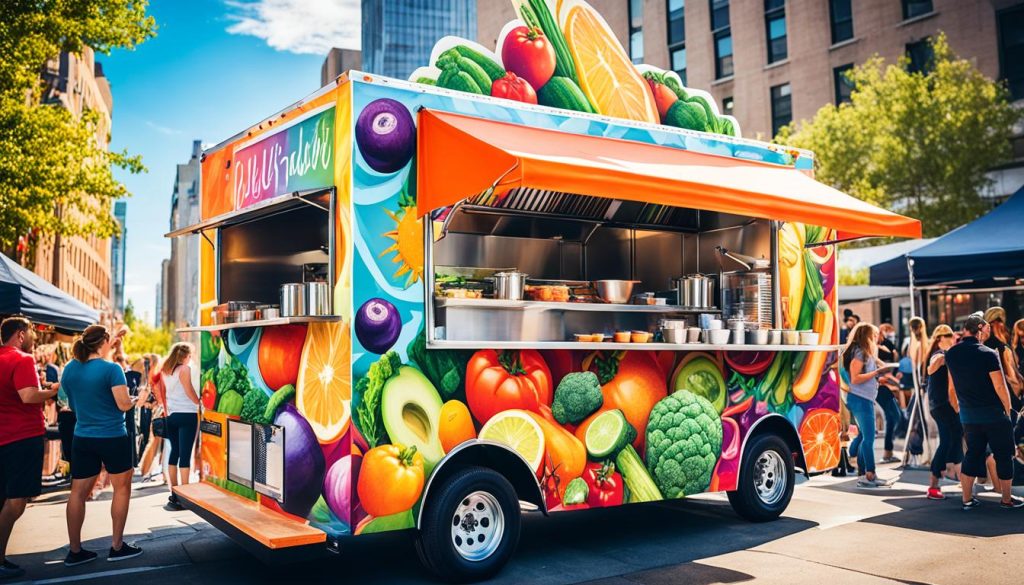In recent years, the food truck business has become a big hit in the UK. It’s a great way for new business owners to get into the food industry in a creative and flexible way. This guide offers expert tips and real examples to help you begin and grow a food truck or mobile catering business in the UK.
To start, you’ll need to know the legal requirements, write a solid business plan, and craft a strong marketing strategy. This article covers all the important steps. It’s perfect if you want to sell high-end burgers, handmade pizzas, or dishes from around the world. With the advice here, you can realise your dream of having a successful food truck business in the UK.
Key Takeaways
- First, learn about the necessary laws for your food truck business in the UK. This includes knowing how to register and what licences you need.
- Think about the pros and cons to see if a food truck business aligns with your goals.
- Make your menu and food truck stand out in the UK’s busy market by having a unique identity.
- Build a detailed business plan with solid research, financial forecasts, and ways to grow.
- Ensure your food truck business runs smoothly and profitably by managing it well.
Introduction to Food Truck Business
In the UK, street food is gaining more fans, with food trucks and mobile caterers finding a bigger audience. These ventures began to fill a gap in providing hot meals in cities. Over time, they transformed into sought-after spots for remarkable food experiences.
Starting a food truck business is appealing for several reasons. It offers flexibility, needs less money to begin, and there’s a big demand for it. This brief guide looks into the food truck scene in the UK. We’ll explore what makes it a blooming industry.
Legal Requirements for Food Truck Business
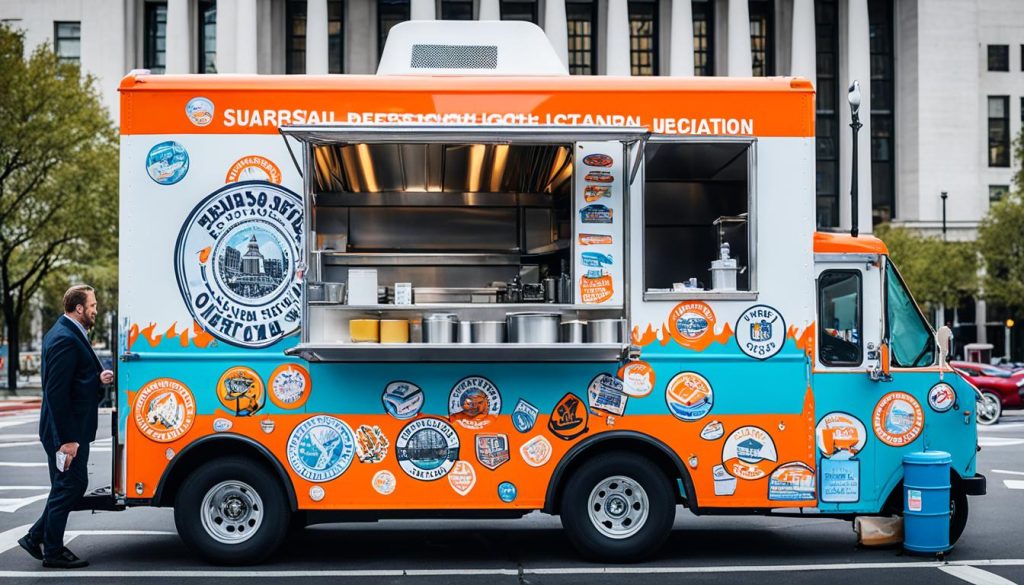
To start a food truck business in the UK, you must meet several legal rules. First, you need to register as a sole trader with Her Majesty’s Revenue and Customs (HMRC). This means giving your personal and business details. You also identify what taxes your business must pay.
Register as a Sole Trader
The first step for any food truck owner is to become a sole trader with HMRC. You will give personal details like your name and address. You also share your business info, such as its name and what you do. This process helps you make sure you follow all the tax rules for your business.
Obtain Necessary Licenses and Permits
Another key step is getting the right licenses and permits to run a legal business. This often means getting a Street Trading Licence and Street Consent Licence. But, the exact ones you need might change from one council area to another. Make sure to check what you need in the places you plan to set up your food truck. This way, you follow all the local laws and rules.
Meet Food Safety and Hygiene Standards
Keeping your food truck clean and safe is very important. You must meet the rules set by the Food Standard Agency (FSA). Also, all your staff should have the right food safety certificates. Always handle, store, and prepare food correctly. This helps make sure your customers eat safely and healthily.
Advantages and Disadvantages of Food Truck Business
Starting a food truck business in the UK has its perks. You have low start-up costs and can decide when and where to work. Plus, you’re the boss of your own venture. But, it also means long hours, hard work, and facing possible breakdowns or traffic issues. You must adhere to strict regulations and compete in a crowded market.
Compared to a restaurant, food trucks need less money to begin. Their mobility means they can go to events and busy places, finding more customers. Being in charge of your time and business appeals to many.
However, the job can be tiring. Problems like vehicle issues or traffic jams can hurt your sales. Dealing with local laws and permits takes time and effort. And the market is full of competition.
Thinking of starting a food truck? Be sure to consider both the good and the bad. Knowing the challenges and benefits can help you get ready for this exciting but tough business.
Choosing Your Niche and Menu
Starting a food truck business in the UK means picking a niche that sticks with your audience. Popular choices are burgers, hot dogs, pizzas, fish and chips, roast hog, and breakfast sandwiches. You can also try your hand at less common treats like Ethiopian, Filipino, Iranian, or Malaysian dishes.
Finding a Unique Niche
Being different helps your food truck shine in the UK. If you serve food not often found, you can grab the attention of those looking for unique bites. This approach can turn first-time eaters into fans and build the name of your brand.
Menu Development and Dietary Considerations
Your food truck’s menu must be easy to make, use fresh ingredients, and consider dietary needs. A well-crafted menu that caters to many tastes is key for your food truck to do well. Make sure to cover most bases when creating your offerings.
Creating a Business Plan
A thorough business plan is key for every food truck startup. The heart of this plan is the executive summary. Here, you outline your business idea, target customers, what sets you apart, money forecasts, and aims.
Executive Summary
The executive summary gives a quick, clear view of your food truck business. It talks about what makes you special, who you’re aiming at, financial guesses, and goals. This part is your business’s best face for possible investors or lenders.
Market Analysis and Target Customers
It’s vital to really know your target market through solid research. This means understanding their details, likes, and the competition. Knowing this helps shape your menu and how you’ll attract your audience. By spotting gaps in the local market, you can stand out with your food truck.
Financial Projections and Funding
Your plan needs to crunch the numbers, covering startup, running, and income. This is crucial to see if your business can make it and to point out any money needs. If you’re looking for financial support, explain how much you need and what it will do for your business’s future.
Setting a Budget for Food Truck Business
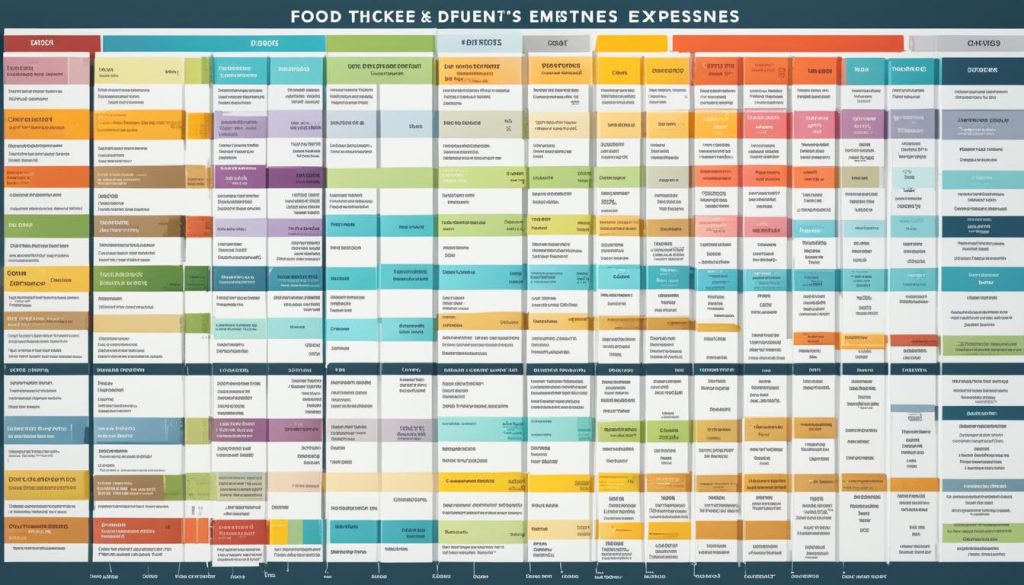
Starting a food truck business in the UK needs different amounts of money. You might need around £5,000 for a small, used catering trailer. Or over £50,000 for a big, new food truck. The cost depends on the vehicle type, equipment, and licenses.
Initial Investment Costs
Choosing the right vehicle is key and affects your starting costs a lot. You can start with a cheaper, second-hand trailer. Or invest in a new, high-tech food truck. The equipment you need, such as ovens and fridges, also adds to your costs. Getting all the permits and doing any vehicle renovations will increase your start-up expenses.
Ongoing Operational Expenses
After the start-up, there are many regular expenses for food truck owners. This includes buying food and paying for staff. You’ll also have to cover insurance, vehicle maintenance, and marketing. Planning and managing these ongoing costs well is essential for making your business profitable in the long run.
Selecting and Outfitting Your Food Truck
Deciding on the right food truck or mobile catering unit is key. You must think about its size, design, and whether it’s new or used. Also, look at how you can make it your own and if it will be easy for customers to reach. Choosing a vehicle that meets your business’s needs is crucial. Do your research to find the best fit.
Choosing the Right Vehicle
Thinking about a food truck means looking at its size and design closely. The vehicle should let your team work well and give customers a good service. You also need to pick between new or used, based on its condition, what you can add, and your budget.
Essential Equipment and Supplies
Setting up your food truck with the right gear is essential for safe and efficient food prep and serving. You’ll need things like sinks for washing and cleaning, a grease trap, water heaters, an extractor fan, and storage for food and tools. Plus, don’t forget about a fridge or freezer and the cooking gear.
Branding and Marketing Strategies
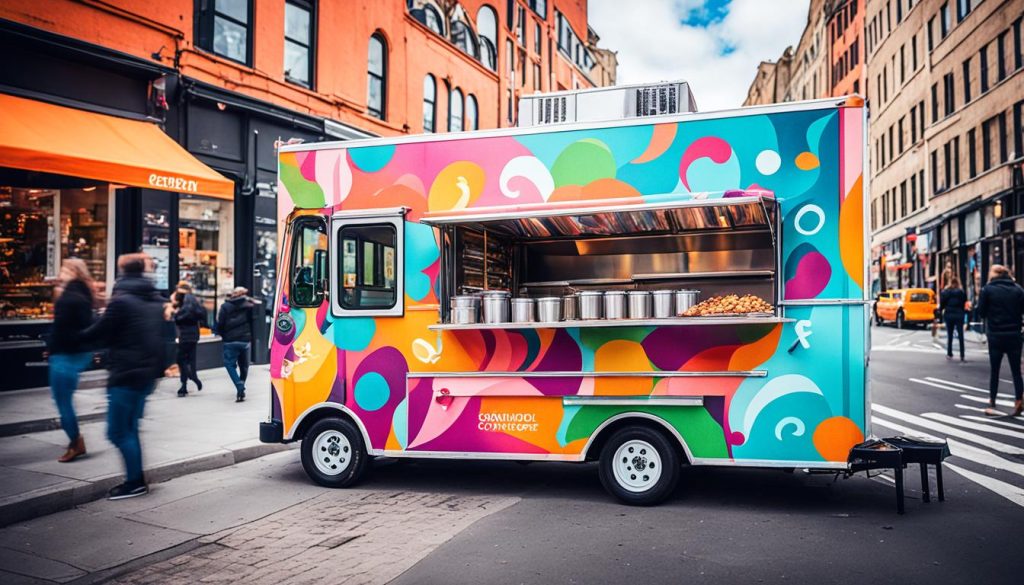
For a food truck to succeed, it must have a strong brand identity. This involves picking a catchy name, creating an attractive logo and colours, and making a language that fits the business. This makes the truck more memorable.
Developing a Strong Brand Identity
A food truck needs to be memorable to get people’s attention. Through a strong brand identity, it can connect with its target market. This helps in standing out in the busy food market.
Social Media and Digital Marketing
Using social media, like Facebook, Instagram, and TikTok, can greatly promote a food truck. Sharing nice photos and fun content on these platforms can attract more people. This, in turn, helps in selling more.
Collaborating with Local Influencers
Working with local influencers is a smart move for food trucks. They help to spread the word to a larger audience. This way, the business gains more credibility among potential customers.
Food Truck Business Operations
Choosing the right spot for your food truck is key to doing well. Look for places with lots of people walking by. Also, check out the competition, how easy it is for customers to get to you, and any rules for food trucks in the area. Keeping your customers updated on where to find you helps bring in more business.
Securing Optimal Locations
For your food truck, aim for places where many people walk, like busy city centres or spots popular with tourists. Make sure to pick spots that aren’t too close to other food trucks. Also, your food truck should be easy for customers to reach. Don’t forget to check local rules for food trucks so you’re on the right side of the law.
Maintaining Food Safety and Hygiene
Keeping your food truck clean and safe is vital. Handle, store, and prepare food correctly. Make sure your cooking area is always clean and well-organised, too.
It’s a must to follow the Food Standard Agency’s rules. This keeps your customers safe and happy.
Managing Financials and Profitability
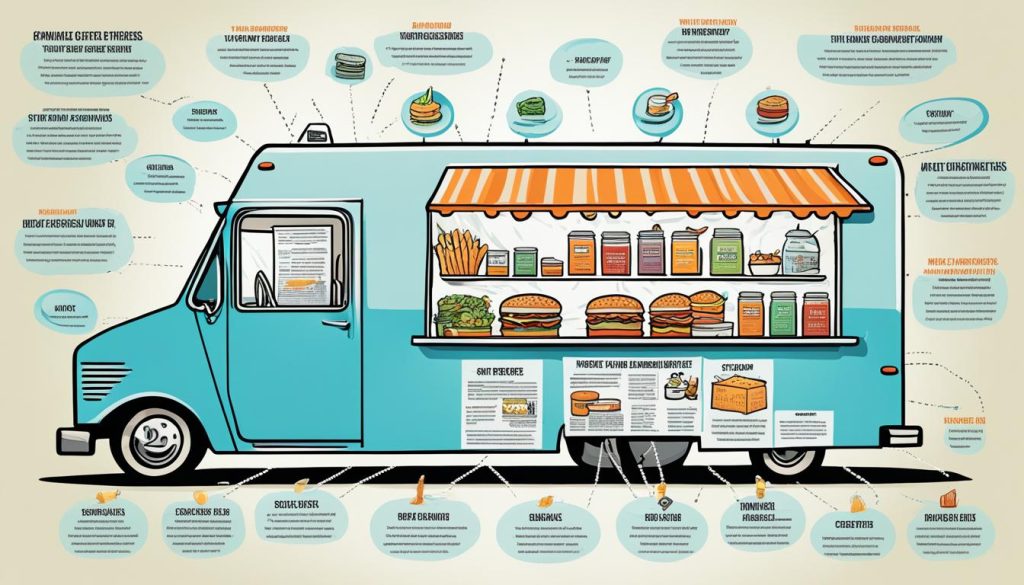
Running a food truck successfully needs careful handling of finances. This involves planning a detailed budget that covers all costs, from the truck and tools to food, wages, and upkeep. Keeping a close eye on spending helps to boost profits.
Budgeting and Cost Control
Setting up a solid budget is vital for the financial health of a food truck venture. This should account for everything from the truck itself to daily operating costs like fuel and wages. Smart spending and regular checks on costs open the door to increased profit.
Pricing Strategy and Revenue Streams
Getting prices right is crucial for making money and staying profitable. It’s important to look at what other successful food trucks in the UK charge. Also, find extra ways to make money, like catering or private events. This mix of competitive pricing and new revenue sources can lead to ongoing business success.
Expansion and Growth Opportunities
Once a food truck business starts doing well, there are chances to grow. Options include getting more trucks, starting a restaurant, or offering new food.
It’s important to study the market, your money, and what you can manage. By researching what customers want, what your rivals are doing, and if your ideas could work, you’ll pick the best path.
Getting more trucks can mean reaching more people, boosting your earnings and your share of the market. Or, opening a restaurant can give you a solid place and make things more straightforward.
Offering different kinds of food or services is another way to grow. You could try new dishes, cater to special diets, or do events. This can attract more customers and make your income steadier.
But, whatever you do, it’s vital to stay flexible and focused on making your customers happy. With good plans, smart moves, and love for what you do, your food truck can do really well.
Food Truck Business Success Stories
The UK’s food truck scene has seen many great tales of success. Businesses like The Halal Guys, Cantine California, and MeatLiquor have really shone. They show how well food trucks can do here.
The Halal Guys began in New York on a food truck. Now, they’re also in the UK, with restaurants that everyone loves. Their halal food is known for being genuine and tasty.
Cantine California went from a single food truck to many restaurants. They satisfy people with their Mexican dishes all over the UK. It’s quite a tasty success story.
MeatLiquor started as a food truck in London. It was all about gourmet burgers and cool drinks. Now, it’s a big chain of restaurants across the UK. They’re known for awesome food and a fun time.
These stories really inspire in the UK’s food truck world. They show that food trucks can really make it big here. And they can change the way we think about food.

